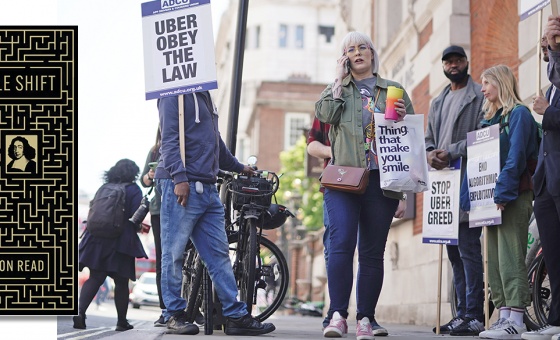This is the last article you can read this month
You can read more article this month
You can read more articles this month
Sorry your limit is up for this month
Reset on:
Please help support the Morning Star by subscribing here
THERE has been no summer break in Scotland for those engaged in party politics. The Scottish Conservatives have been caught up in the leadership election. The two candidates seem determined to rally support for independence by their obvious disdain for devolution.
In early July the Scottish Labour Party issued Better Government for the UK. It was announced as the first in a series of documents, but this first paper seems to have disappeared. It is possible that it was sidelined because, as Anas Sarwar said in his speech, Labour is now proposing a new senate where members should be directly elected, with a mandate to represent their nation or region.
The SNP government has so far produced two of what will be a series of papers under the collective title Building a New Scotland — the first was reviewed by Vince Mills in the Morning Star (No clarity on who really runs Scotland, July 5). This has now been followed by Renewing Democracy Through Independence.
As with the previous paper, it takes the SNP’s arguments and treats them as facts. In the second paper it does mention other perspectives but only to dismiss them.
Renewing Democracy argues that we have tried devolution and it has failed. It neglects to mention the SNP’s absence from the Constitutional Convention which in 1989 drew up the Claim of Right of the Scottish People to form its own government and led to the creation of the devolved parliament.
Nor is there any examination of the failure to use the existing Scottish Parliament powers to introduce more radical policies. Interestingly, the SNP trade union group proposed a motion to this October’s SNP conference proposing “creative and bold use” of the “wide range of tax powers” available to the Scottish government to tackle the cost-of-living crisis — but it has been excluded from the draft agenda.
The document makes the case that the sovereignty of Scottish voters has been established by the holding of referendums. It doesn’t mention that the 1997 referendum gained overwhelming support for a devolved Scottish Parliament with 72 per cent in favour. This compares with 44.7 per cent voting for independence in the 2014 referendum.
Both of these results were the sovereign decisions of the Scottish people, but only one suits the narrative of the SNP. Whatever they argue, there has never been a clear majority for independence in Scotland.
The SNP is not alone in its criticism that the devolution settlement of 1998 failed to take account of the sovereignty of Westminster. The UK Parliament can give more powers to the devolved administrations — but can also take them away.
The election in 2019 gave Boris Johnson a huge amount of power to govern with a large Tory majority meaning he could ignore any other views in Parliament. But as we have seen, things can change. When facing electoral disaster, Tory members of Parliament reasserted their power and are forcing Johnson out the door of Downing Street. Unforeseen events can happen, including the election of Jeremy Corbyn as leader of the Labour Party.
The experience of the Tory centralisation of power in London has increased support for more powers being given to the nations and regions. Mark Drakeford, First Minister for Wales, supports the demand for radical federalism, arguing that it could allow “the potential of the United Kingdom as a powerful engine of redistribution, putting a greater and fairer share of wealth and income into the hands of those who most need it — in whatever part of the United Kingdom that might be.”
Mayor of Greater Manchester Andy Burnham has made the case for “rewiring” Britain, including getting rid of the House of Lords and establishing a new senate of the nations and regions.
But the Scottish government document doesn’t give serious consideration to anything other than two positions: independence or the status quo. It describes and then dismisses any other option.
One option, it explains, “could be to give added protection in legislation to the devolved institutions and their powers and responsibilities through fuller legislative protection of the Sewel Convention or a statutory underpinning for intergovernmental relations machinery.
“Another option could be to enhance the powers of the devolved nations so that a bare minimum rest exclusively with the UK Parliament (a maximum devolution model sometimes called “devo-max”).
“A third is what is sometimes called ‘federalism’ to secure the powers and responsibilities of the nations of the United Kingdom so that they are an embedded or permanent part of the UK’s constitution. These ideas are not new, although they have gained greater prominence as part of the debate about Scottish independence.”
These are all dismissed on the grounds, in the case of federalism and even increasing devolution, that it would require a “radical departure from historical and cultural tradition, as well as current policy, and there seems no realistic possibility of the collective political will to undertake it.”
What it doesn’t acknowledge is that a senate of the nations and regions has been included in the last three Labour manifestos; it is supported by the Labour leadership in Wales, Burnham and other elected mayors support it and the Liberal Democrats have long argued the case, even if their model could hardly be described as “radical.”
The Scottish government has so far resisted accepting that another option should be available to Scottish voters in a referendum. Nicola Sturgeon says she is now open to compromise with a new prime minister. Perhaps a third option on the ballot paper could be the basis of that compromise.
What the left should be arguing is that the case for federalism must be based on radical change. It should have as its core the principles of the redistribution of wealth throughout Britain, the ability to have democratic control of the economies of the nations and regions and that it maintains the solidarity of working people wherever they live or work.
What we do know for certain is that Scotland is split 50-50 on the issue of independence — something that is not acknowledged in the Scottish government’s document. Can this really be the basis for launching a new independent nation?
If we believe in sovereignty, then a referendum must allow clear choices for people in Scotland. They should not be forced into having to decide between two ends of the spectrum — independence or the status quo. They should have the right to vote for a third option based on greater powers to introduce radical change to ensure greater equality, democracy and solidarity.











